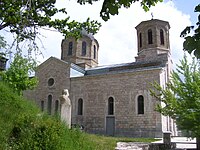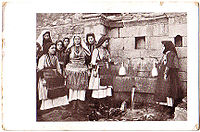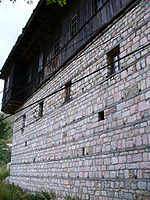You can help expand this article with text translated from the corresponding article in Macedonian. (January 2022) Click for important translation instructions.
|
| Galičnik Галичник | |
|---|---|
| Village | |
 | |
 | |
| Coordinates: 41°35′39″N 20°39′11″E / 41.59417°N 20.65306°E / 41.59417; 20.65306 | |
| Country | |
| Region | |
| Municipality | |
| Highest elevation | 1,500 m (4,900 ft) |
| Population | |
| • Total | 48 |
| Time zone | UTC+1 (CET) |
| • Summer (DST) | UTC+2 (CEST) |
| Car plates | GV |
Galičnik (Macedonian: Галичник) is a mountain village in North Macedonia and along with Lazaropole is one of the two biggest and oldest Mijak villages in the region. Galičnik has well-preserved traditional architecture, including an amphitheater in the village square, and is famous for its surrounding countryside and nature reserve.
History
The village is located in the ethnographic region of "Mijačija", named after the Mijaks (Мијаци/Mijaci), the tribe historically inhabiting this mountainous region. This region has plentiful rich pastures for livestock grazing and this feature attracted Vlachs, shepherds, who established settlements based on cattle-breeding and shepherding.
Events
The most important event in the village is the Galička Svadba, a traditional wedding custom held annually in summer (in July), on the day of the village feast of the Patron Saint – Petrovden (St. Peter's day). During the wedding, local men will dance the "Teškoto" (the "hard" or "heavy") - a dance that is meant to symbolize the overcoming of difficulties in life.
Culture
The regional art, dress and music are rich in detail and original in character. While sharing characteristics of regional culture dating back centuries.
The traditional dress and costume adorned during ceremonial events is highly detailed and unique. Examples can be seen at museums.
The village is built based on traditional housing standards used for centuries in the region. Stone wall construction, supported by wooden beams, compact earth insulation and using stone slate roofing.
Historic houses
See also: Category: GaličnikThere are many houses owned by prominent families in Galičnik that are protected by the Macedonian Cultural Heritage Protection Office. A selected few are as follows:
Notable people from Galičnik
- Slavko Brezoski (1921-2017)
- Lazar Ličenoski (1901-1964)
- Doksim Mihailović (1883–1912)
- Risto Ognjanovikj-Lonoski (1870-1941)
- Georgi Pulevski (1817–1895)
- Aleksandar Sarievski (1922–2002)
- Partenij Zografski (1818–1876)
-
 Galičnik, Skudrinje and Debar lake.
Galičnik, Skudrinje and Debar lake.
-
 Church of St. Peter and Paul.
Church of St. Peter and Paul.
-
 Old postcard from Galičnik - 1903-1908.
Old postcard from Galičnik - 1903-1908.
-
 Architecture in Galičnik.
Architecture in Galičnik.
-
Request with a stamp from Kipro Mitrev, from village Sushica, Galichnik area, asking to get permission to buy sheep. (18 March 1917)
-
Population by nationality in ten municipalities of the city's municipal government of the City Galichnik 1917.
References
- Linda Welters (1 November 1999). Folk Dress in Europe and Anatolia: Beliefs about Protection and Fertility. Bloomsbury Academic. pp. 100–. ISBN 978-1-85973-287-8.
- "Teskoto". www.soros.org.mk. Archived from the original on 2008-07-24. Retrieved 2008-10-19.
- "Galičnik Items". British Museum.
- Slavko Brezoski (1993). Rekanska Kuќa, Arhitektonsko Nasledstvo vo Makedonija. University of Skopje, Architecture: Bigoss.
- Bužaroski, Risto (2004). "Naša Kniga". Галичка повест [Galičnik History] (in Macedonian). Skopje: NIK. p. 176.
External links
- Official web site of Galichnik
- Penultimate Phase of Procedure for Entrance of Galicnik Wedding in UNESCO List - Custom with More than 30 Rites
- Galicnik Macedonia, Kinoteka na Makedonija 1939-40 from filmarchivesonline
- Images from Galičnik
- Photos from Galichnik Wedding
- "Narodne pesme bugarske (iz Galečnika)", folk songs from Galichnik, published in the Croatian magazine "Kolo; Članci za Literaturu, Umetnost; Narodni Život", knjiga IV/V, Zagreb, in 1847.
